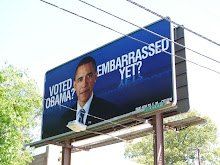WASHINGTON (AP) — Barack Obama is the first wired president, ready to exchange e-mail with close friends and advisers. When do the rest of us get to read them?
We may have to wait until as late as 2028, depending on when Obama leaves office as president. That's according to leading presidential historians who make their living hunting through records at the National Archives and Records Administration.
White House lawyers maintain that Obama's messages are subject to the Presidential Records Act, a post-Watergate law intended to stop former presidents from carting away the records of their time in office. But the law also gives ex-presidents exclusive access to their own records for lengthy periods, allowing them to cash in on memoirs that rely on material the public hasn't seen.
"Basically, anything that Obama's thumbs tap out into the ether is of historical value and has to be saved," said Tom Blanton, director of the National Security Archive, a private Washington-based group that seeks to open government information to the public.
Obama's electronic circle of friends includes some senior staffers and some personal friends who "are able to BlackBerry with the president so he can stay in touch with them," White House press secretary Robert Gibbs told reporters Friday.
Historians already are drawing parallels between Obama's e-mails and the communications habits of some of his predecessors. President Richard Nixon dictated late-night memos on important and mundane subjects, giving historians an opportunity to peer inside the administration of the only president to resign from office.
"I wrote a whole chapter in my book from those late-night memos," said University of Wisconsin Professor Stanley Kutler, author of "The Wars of Watergate."
Under the Presidential Records Act, former presidents and vice presidents can restrict access to some of their records, including confidential communications with advisers, for up to 12 years. If Obama were to serve two full terms, that would put the release date for many of his records at 2028.
Former Presidents Ronald Reagan and George H.W. Bush made such claims. Former President Bill Clinton was more open, waiving some of the privileges invoked by Bush and Reagan.
Five years after a president leaves office, the public can begin requesting documents. Reagan released huge chunks of material after only five years, including many on his meetings with Soviet leader Mikhail Gorbachev.
In 2001, President George W. Bush gave former presidents and vice presidents more authority beyond the 12-year period to claim executive privilege. Obama overturned Bush's order on his first full day in office this week. Bush's order enabled the withholding of papers that contained military, diplomatic or national security secrets, communications among the president and his advisers or legal advice.
Another President Obama Solar Firm goes Bankrupt Fed energy loan $400
million
-
WASHINGTON - A Colorado-based solar panel maker that received a $400
million loan guarantee from the Obama administration said Thursday it will
file for ba...
13 years ago








No comments:
Post a Comment